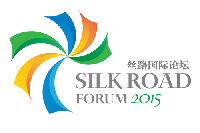2015 Silk Road Forum
2015-10-08

Objectives
For more than two millennia, the land and maritime Silk Road has linked the major civilizations of Asia, Europe, and Africa whilst fostered trade in goods, services, people, technology and ideas across thousands of kilometers. It has long been held as a key symbol of communication and cooperation between the East and the West. As outlined in various fora and by numerous stakeholders, the Silk Roads paradigm envisions the creation of a vast interconnected network of land and maritime corridors that would link three continents. Most notably, Chinese President Xi Jinping has proposed the initiative of jointly building the Silk Road Economic Belt and the 21st-Century Maritime Silk Road (hereinafter referred to as the Belt and Road). This has attracted close attention from all over the world, for it ultimately aims to establish an open community of shared interests, responsibilities and commitments to freer trade and integrated economic growth.
The 2015 Silk Road Forum will provide an open and inclusive platform for countries along the Belt and Road to engage in jointly building this strategic undertaking and advancing practical cooperation. By carrying on the Silk Road Spirit—“peace and cooperation, openness and inclusiveness, mutual learning and mutual benefit”—the Forum hopes to pool the experience and best practices from distinguished statesmen, senior figures in governments, think tanks, enterprises, and academic institutions for promoting common development and prosperity of the world.
The first annual conference of the Silk Road Forum was held with success in Istanbul, Turkey in December 2014. More than 200 participants attended the meeting, frankly exchanging their ideas on the Belt and Road Initiative. Forty-plus high-ranking leaders and senior officials from government, think tank leaders, and academia delivered speeches at the forum. The 2015 Silk Road Forum will consider topics such as infrastructure connectivity, international cooperation in production capacity, Silk Road construction, and the post-2015 sustainable development agenda.
This year’s conference will also witness the launch of a “Silk Road Think Tank Network (SiLKS)”, which is expected to combine the wisdom of global think tanks for the building of the Silk Road and promotion of world peace and development. A business round-table will also be held to discuss key issues concerning investment and cooperation among enterprises.
The 2015 Silk Road Forum will consider topics such as infrastructure connectivity, international cooperation in production capacity, Silk Road construction, and the post-2015 sustainable development agenda.
DRAFT AGENDA(28-29 October 2015)
Grace Wang: Working Paper: Scaling-up South-South Cooperation for Sustainable Development
OECD:A SILK ROAD FOR THE 21ST CENTURY: INITIAL REFLECTIONS ON NEW OPPORTUNITIES FOR PARTNERSHIPS
Patrick Ho: Some thoughts about the Think Tanks Alliance
Slawomir Majman: Silk Road on the Central and Eastern Europe Angle
News
Belt and Road set to help global economic recovery
Initiative success hinges on infrastructure funding
Contact
Tel:86-10-65235565
FAX:86-10-65236060
E-MAIL:[email protected]














